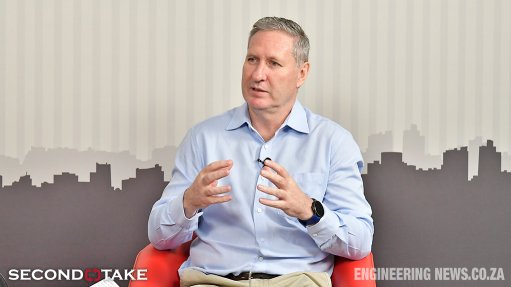Standard Bank partners with citrus sector to realign for growth
This article has been supplied.
Annual citrus summit presents opportunity for collaborative approach to current challenges
Standard Bank’s sponsorship of the Citrus Growers Association of Southern Africa Summit since its inception in 2017 reflects the bank’s decades-long commitment to the South African citrus sector.
Over the past decade Southern Africa’s citrus industry expanded exponentially, increasing hectarage from 60 355 in 2012 to 99 697 in 2022. The sector was also extremely active in adding new cultivars, modernising practices and technologies and building the structures to promote and ship product globally. Thanks in large part to these efforts, South Africa is today the world’s second-largest exporter of citrus, after Spain.
Despite this growth, Southern Africa’s citrus sector is currently facing a perfect storm of challenges. “Global supply chain disruptions and market volatility, domestic logistics decay and increased shipping costs have combined with energy constraints, phytosanitary challenges, oversupply and hail and other climate impacts, all of which are presenting formidable threats to solvency in the sector,” says Nico Groenewald, Head of Agriculture (SA) at Standard Bank.
The Citrus Growers Association (CGA) was established in 1997 to represent the interests of the producers of export citrus. The CGA’s focus on optimising the cost-effective production of quality fruit while supporting access to global markets through improved logistics, research, education and environmental care complements Standard Bank’s commitment to driving growth in Africa by building sustainable agricultural value chains,” says Nico Groenewald, Head of Agribusiness (SA) at Standard Bank.
The annual Citrus Growers’ Association of Southern Africa Summit presents an important platform on which to unite as a community, take stock, and focus on “understanding how to ensure financial sustainability by building balance sheet resilience in tough times,” explains Groenewald.
While in good times balance sheets inevitably gear to maximise future financial gain, when market conditions turn, balance sheets are often unable to sustain these gearings. Instead, the golden rule is to balance optimism for the future with a disciplined approach to building or maintaining balance sheet stability.
“Growth strategies that are too fast, too large, and too one-dimensional unfortunately often result in depressingly high and unsustainable costs over time,” cautions Groenewald.
Instead, the size, intervals and timeframes on which investment decisions are made today should also hold in less favourable cycles. This is especially so in agriculture, which by its very nature is unpredictable. Since uncertainty equals risk, “agricultural production needs to build risk resilience into long-term plans so that balance sheets can retain their relevance under less favourable conditions,” advises Groenewald.
By balancing growth with hurdle profitability rates while setting inhouse requirements around cash reserves in lean times, for example, producers will be in a stronger position to leverage the next big growth opportunity when the cycle turns.
Despite the challenging outlook, Groenewald believes that it is in difficult times that the best decisions are made. Certainly, at the individual farm level there is a lot that can be done to mitigate adverse external conditions in negative cycles. On-farm efficiencies, and especially cost management and targeted capital expenditure, can be refined. Where needed, cultivars can be replaced. Plans can also be developed for the next positive cycle that will “pace the rate of expansion in tandem with market insight and individual producer balance sheet and cashflow positions,” explains Groenewald.
One certainty in agriculture is that it is cyclical. Just as citrus producers have been under balance sheet pressure for the past two seasons, “we can be certain that in time things will improve,” says Groenewald.
Yet, regardless of cycle, both change and growth require funding. This is where banks are especially well positioned to help. By viewing both tough and good times as opportunities to make the right decisions, “producers can position themselves, regardless of where we are in the cycle, to manage ongoing challenges and capitalise on opportunity when the fundamentals improve,” he adds.
Acting fast is key.
The moment cashflows become a challenge, it is essential to “reassess quickly so that you can continue to grow and invest – in the right things,” says Groenewald. The key goal should be for every citrus producer to have a clear view of the balance sheet ratio they need to achieve now to maximise the next positive cycle. Understanding that a healthy balance sheet doesn’t only deliver profits, but also “optimises cashflow through disciplined cash management in line with a strictly enforced recovery strategy is critical to saying no to opportunities that don’t support that strategy,” observes Groenewald.
Beyond the individual farm level, however, the current perfect storm in the citrus sector also highlights the need for producers and the wider citrus value chain to broaden their frames of reference. Beyond balance sheets, cashflows, cultivars, farming techniques, fertilisers, transport and markets, the sector also needs to take energy availability and costs into account, both for themselves and for their broader value chains, especially transport, logistics and energy-vulnerable pack houses.
Broader systemic challenges are best tackled through collaboration, working through organisations like the Citrus Growers Association of Southern Africa and their broad stakeholder ecosystems, including research associations, auditors and financial service providers. In addition, most large banks can bring their financing and risk management platforms as well as their cross-border reach and global ability to the table, “assisting producers with the crafting of integrated long-term balance sheet strategies sufficiently disciplined to support resilience and sustain through-the-cycle growth,” concludes Groenewald.
Comments
Press Office
Announcements
What's On
Subscribe to improve your user experience...
Option 1 (equivalent of R125 a month):
Receive a weekly copy of Creamer Media's Engineering News & Mining Weekly magazine
(print copy for those in South Africa and e-magazine for those outside of South Africa)
Receive daily email newsletters
Access to full search results
Access archive of magazine back copies
Access to Projects in Progress
Access to ONE Research Report of your choice in PDF format
Option 2 (equivalent of R375 a month):
All benefits from Option 1
PLUS
Access to Creamer Media's Research Channel Africa for ALL Research Reports, in PDF format, on various industrial and mining sectors
including Electricity; Water; Energy Transition; Hydrogen; Roads, Rail and Ports; Coal; Gold; Platinum; Battery Metals; etc.
Already a subscriber?
Forgotten your password?
Receive weekly copy of Creamer Media's Engineering News & Mining Weekly magazine (print copy for those in South Africa and e-magazine for those outside of South Africa)
➕
Recieve daily email newsletters
➕
Access to full search results
➕
Access archive of magazine back copies
➕
Access to Projects in Progress
➕
Access to ONE Research Report of your choice in PDF format
RESEARCH CHANNEL AFRICA
R4500 (equivalent of R375 a month)
SUBSCRIBEAll benefits from Option 1
➕
Access to Creamer Media's Research Channel Africa for ALL Research Reports on various industrial and mining sectors, in PDF format, including on:
Electricity
➕
Water
➕
Energy Transition
➕
Hydrogen
➕
Roads, Rail and Ports
➕
Coal
➕
Gold
➕
Platinum
➕
Battery Metals
➕
etc.
Receive all benefits from Option 1 or Option 2 delivered to numerous people at your company
➕
Multiple User names and Passwords for simultaneous log-ins
➕
Intranet integration access to all in your organisation

















